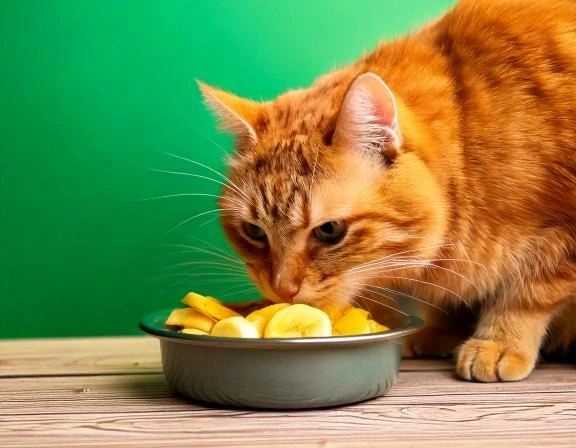Can Cats Eat Plantains? Surprising Facts Every Cat Owner Should Know
By: Lana Koh

The information in this article is intended to educate cat parents and is not a substitute for veterinary guidance. In case of any concerns about your cat’s health, please talk with your veterinarian.
You’re enjoying a delicious plantain dish, and your curious feline friend is eyeing it with intense interest. Can cats eat plantains? The short answer is: Yes, in moderation.
Cats are obligate carnivores, which means their diet primarily revolves around meat. While plantains are not toxic to cats, there are important considerations to keep in mind before sharing this sugary and high carb fruit with your furry friend.
Let’s explore plantains, their nutritional value, and whether they have a place in your cat’s diet.
Related: Can Cats Eat Tofu?
Understanding Plantains
What Are Plantains?
Plantains are a starchy fruit that belongs to the banana family. Unlike sweet bananas, plantains are typically cooked before eating and are a staple in many cuisines worldwide.
Nutritional Profile Of Plantains
Plantains are rich in carbohydrates, potassium, and vitamin C. They also contain fiber and small amounts of vitamin A. While these nutrients are beneficial for humans, they don’t align with the dietary needs of obligate carnivores like cats. According to the USDA, 100 grams of plantains provide approximately 166 calories, mainly from carbohydrates.
Difference Between Plantains And Bananas
Although they look similar, plantains are less sweet and have a higher starch content compared to bananas. This distinction makes them nutritionally different for both humans and animals.
Are Plantains Safe For Cats?
Toxic vs. Non-Toxic Foods For Cats
According to the ASPCA, plantains are non-toxic to cats. However, non-toxic doesn’t always mean suitable, as cats have specific dietary requirements.
Can Plantains Harm Cats?
If consumed in moderation, plantains are unlikely to harm cats. However, feeding them in large amounts can lead to digestive issues such as diarrhea or upset stomach due to their high carbohydrate content.
Benefits Of Small Amounts Of Plantains
In tiny quantities, plantains can provide a novel taste or texture for your cat without significant harm. However, they don’t offer substantial nutritional benefits.
Related: Can Cats Drink Milk?
Why Do Cats Get Curious About Plantains?
Cats’ Natural Curiosity
Cats are naturally curious creatures and often investigate unfamiliar foods out of sheer intrigue.
The Role Of Texture And Smell In Cat Preferences
The soft, chewy texture of cooked plantains and their mild aroma might attract cats, even though they lack the taste receptors for sweetness. Cats rely on smell and texture more than taste when choosing foods.
Related: Can Cats Eat Dragon Fruit?
Nutritional Considerations
Do Cats Gain Nutritional Value From Plantains?
Cats derive most of their energy from protein and fat. While plantains contain nutrients, they aren’t necessary or particularly beneficial for a cat’s health.
Risks Of High-Carbohydrate Foods For Cats
Cats’ digestive systems aren’t designed to handle high amounts of carbohydrates, which can lead to weight gain, diabetes, or digestive discomfort if consumed frequently. Studies from the Pet Food Institute emphasize that a protein-rich diet is essential for cats.
How To Safely Offer Plantains To Cats
Cooked vs. Raw Plantains
Always ensure plantains are cooked before offering them to your cat. Raw plantains can be harder to digest and may pose a choking hazard.
How To Prepare Plantains For Cats
Slice the plantains into small, bite-sized pieces and avoid adding spices, oils, or seasonings that could upset your cat’s stomach. Boiling or steaming is the safest preparation method.
Portion Control
Offer only a small piece initially to observe how your cat reacts. Monitor for any adverse reactions and discontinue if symptoms occur.
Related: Can Cats Eat Seaweed?
Signs Your Cat May Not Tolerate Plantains
Digestive Issues
Watch for signs such as vomiting, diarrhea, or lack of appetite after feeding your cat plantains. These symptoms could indicate intolerance.
Behavioral Changes
If your cat appears lethargic or exhibits unusual behavior, discontinue feeding plantains and consult your veterinarian.
Healthier Treat Alternatives
If you’re looking for safe and nutritious treats for your cat, consider these options:
- Blueberries: Rich in antioxidants and safe in moderation.
- Cooked Carrots: Provide a crunchy texture and are easy to digest.
- Peeled Apples: A source of fiber, but avoid seeds and skin.
- Commercial Cat Treats: Designed to meet a cat’s dietary needs, they are a safer alternative.
Related Article: Can Cats Eat Tuna?
Frequently Asked Questions
Final Thoughts
While plantains aren’t harmful to cats in small amounts, they’re unnecessary in a feline’s diet. Cats thrive on a meat-based diet tailored to their nutritional needs. Prioritize species-appropriate treats and always consult your veterinarian before introducing new foods. By focusing on a balanced diet, you can ensure your cat remains healthy and happy.

About the Author
Lana Koh
Lana is a passionate cat lover with years of experience caring for her feline companions. As a dedicated volunteer at animal shelters, she’s gained valuable insights into the world of cats. Lana channels her love and knowledge into writing informative and engaging articles for fellow pet owners, covering topics like cat health, nutrition, grooming, behavior, and the special bond we share with our feline friends.
